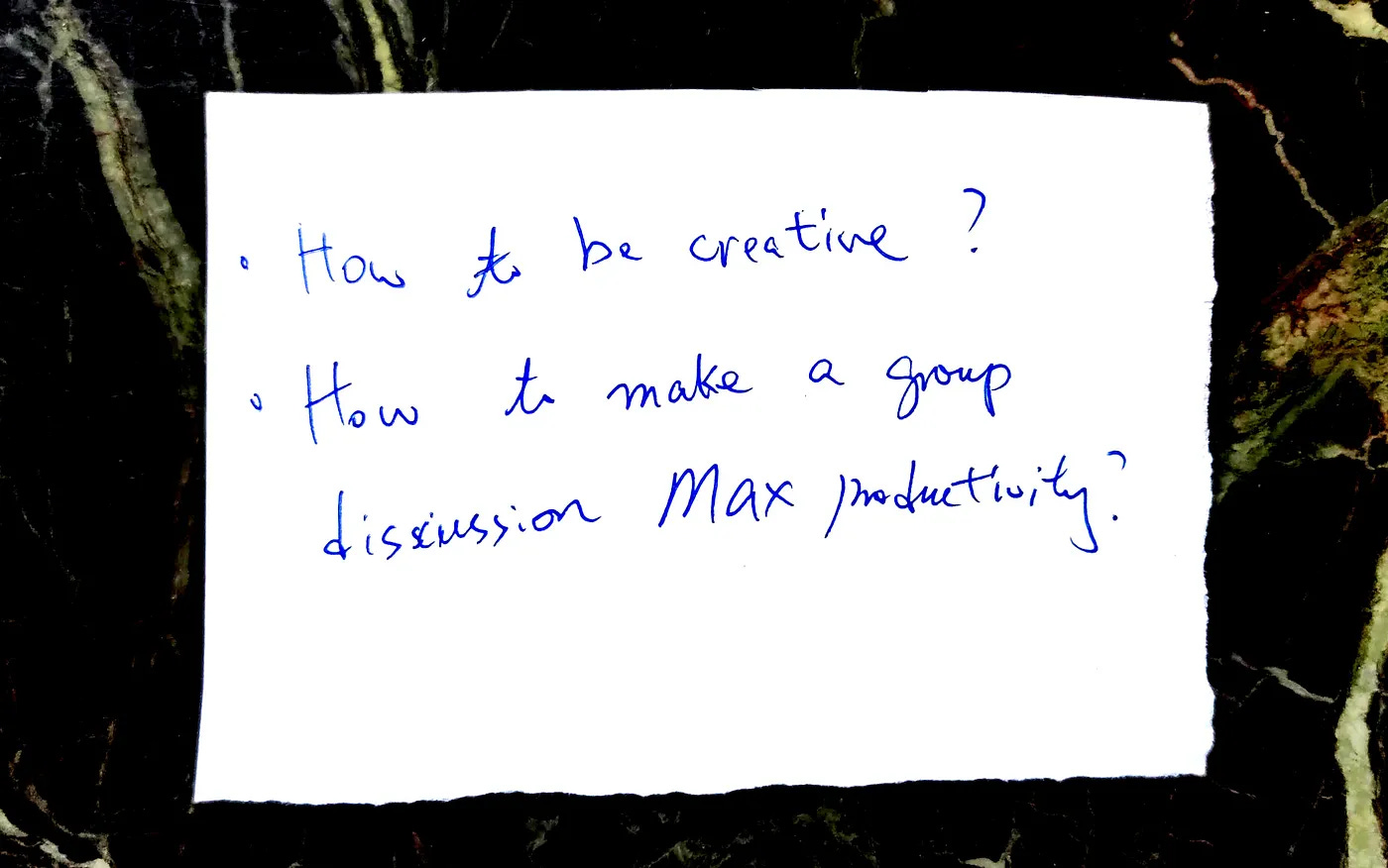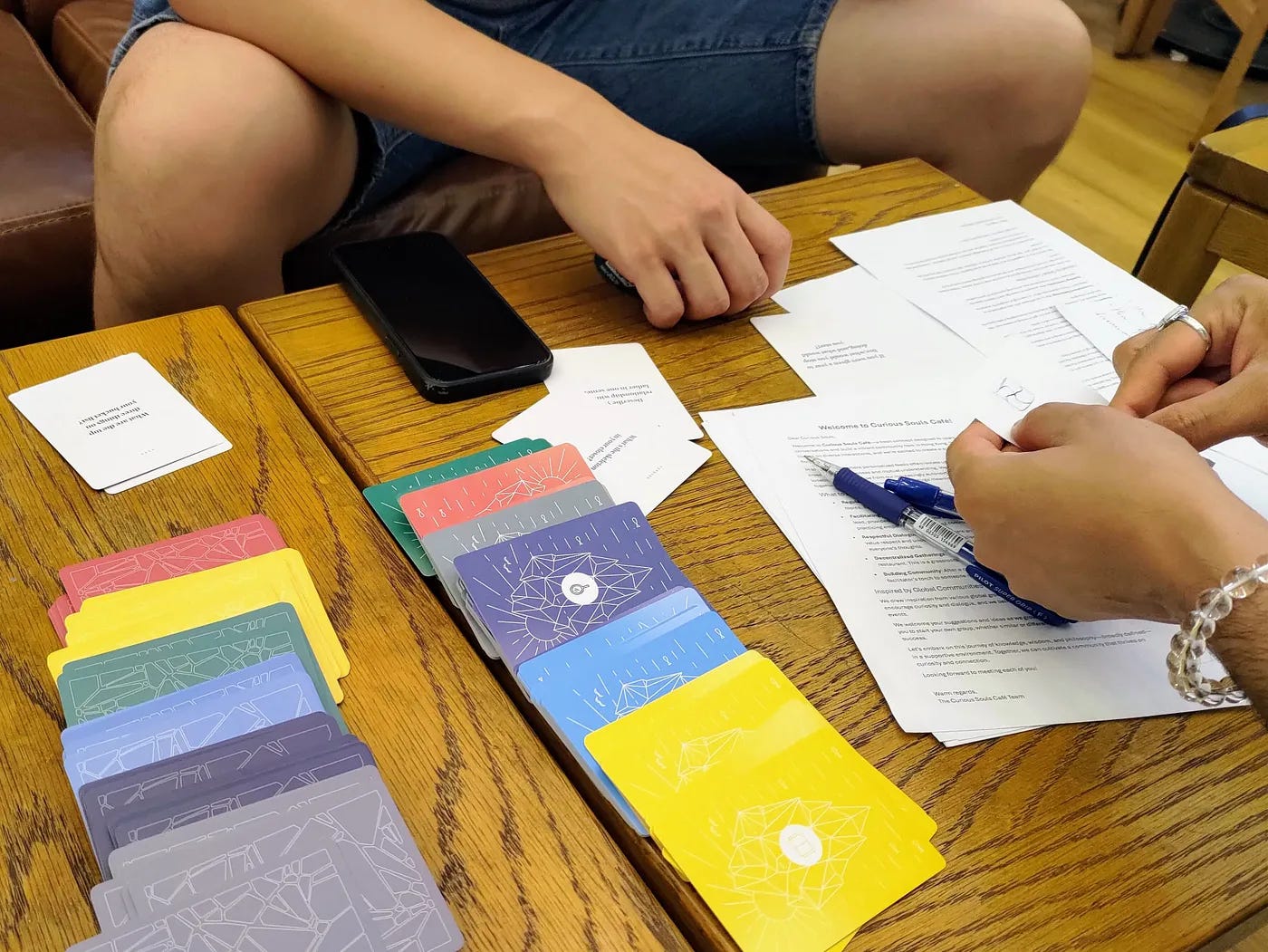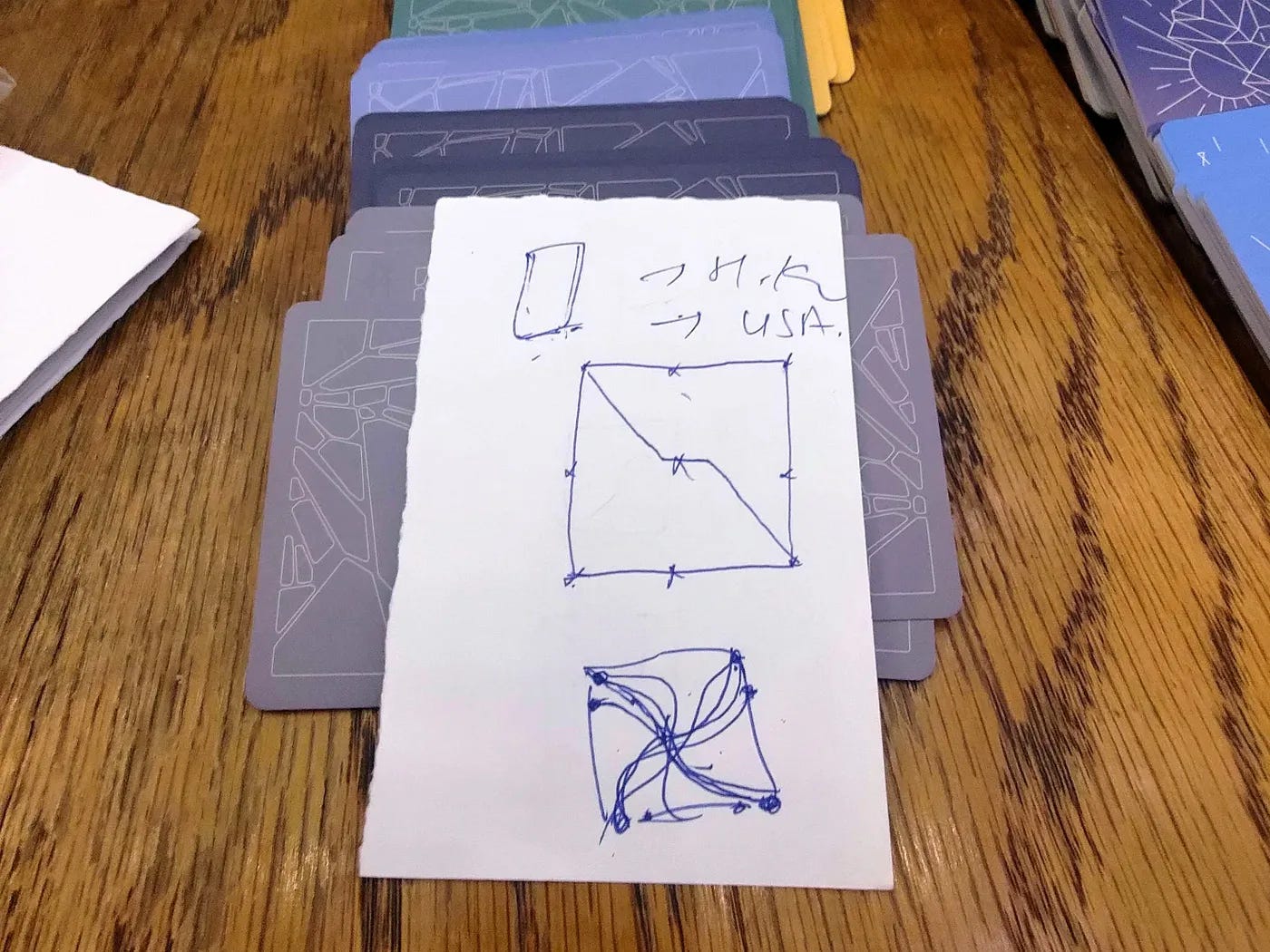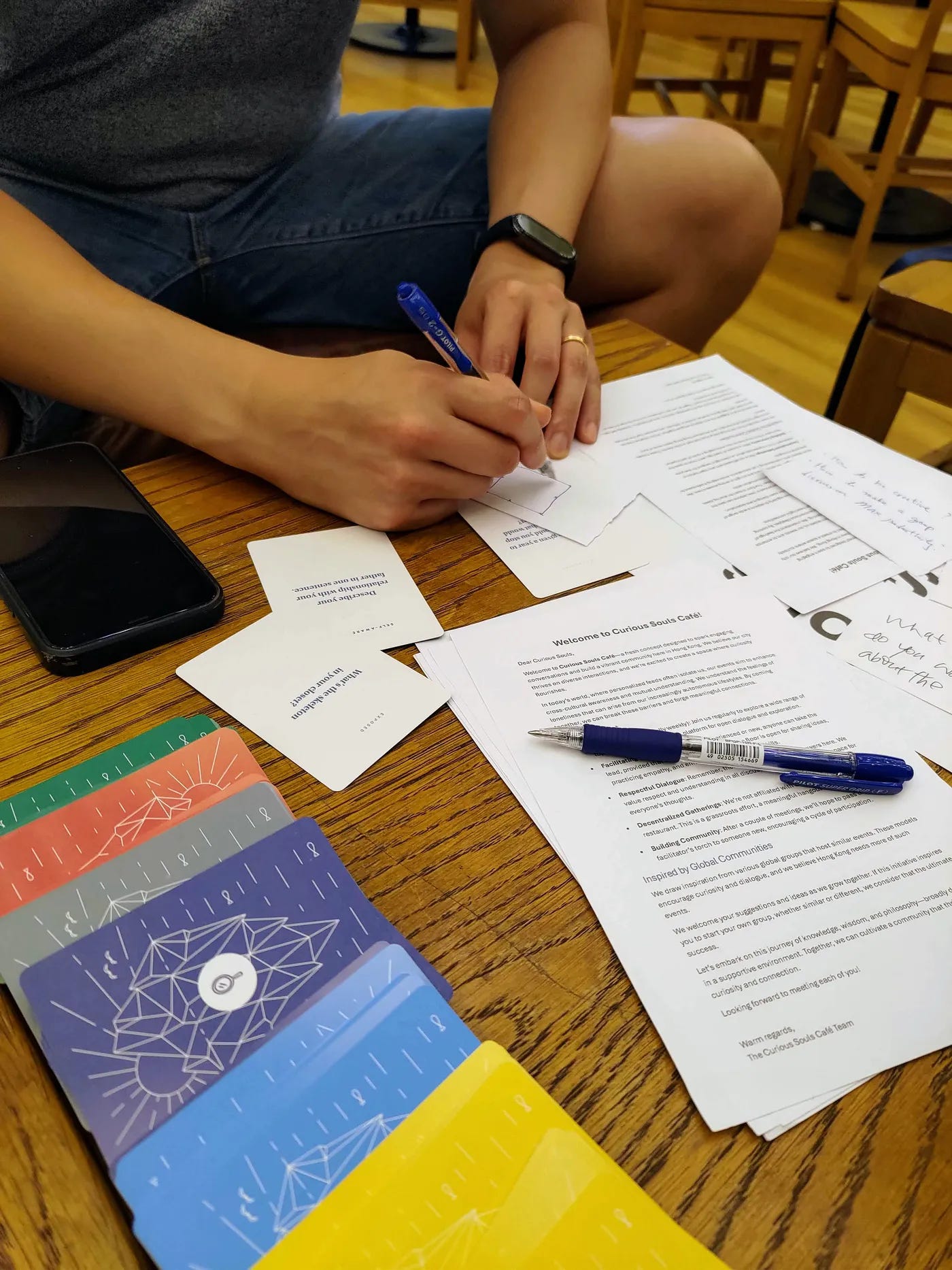From Self-Doubt to Self-Awareness — Navigating Group Dynamics, Creativity in Life’s Complexities
Hey, Curious Souls 👋! On August 15, 2024, the Curious Souls Café gathered in Hong Kong for an engaging meeting filled with lively discussions, personal reflections, and a creativity exercise. Here’s a recap of the insights, experiences, and key themes — self-awareness, personal growth, societal challenges, and group dynamics — shared during the session.
The Weight of Words: Exploring Self-Consciousness and Emotional Awareness
In the first part of the event, each participant gets to choose their preferred question card for discussing with the group. Our first question of the evening was:
“What’s Something You Are Self-conscious About?”
The participants shared their struggle with being self-conscious about potentially hurting others with their words or actions. They emphasize striving for empathy and carefully crafting their responses to ensure clear communication and understanding. This highlights the significance of emotional intelligence and self-awareness in interactions.
“I try to be sort of like empathetic, try to understand their emotions before I respond to something to them instead of just reaction.”
Our facilitator reveals his self-consciousness stemming from his younger years. Having people close to him who are prone to irrationality and emotional volatility, he learned to create a mental distance for self-preservation. However, he expresses concern about this boundary hindering his ability to connect with others. This example underscores how past experiences, particularly early and formative ones, can shape our self-perception and anxieties.
Book Recommendations: Insights and Inspirations from Recent Reads
Several book recommendations emerged during the discussion of the second question:
“What Book Have You Read Recently That You Would Recommend and Why?”
Each participant offered unique insights.
“Traditions are good sometimes but not always. Tradition and fashion can go hand-by-hand, so some modification is necessary.”
One participant recommended “Who Moved My Cheese?” by Spencer Johnson, emphasizing its accessibility and message of embracing change. She highlights the book’s relevance in a rapidly evolving world, encouraging readers to adapt to changes in technology, societal norms, and personal circumstances.
Our facilitator suggested “Everything is F*cked — A Book About Hope” by Mark Manson, praising the author’s contrarian yet truthful perspective on happiness. He found resonance with the book’s emphasis on finding happiness through embracing simplicity and moving away from chasing fleeting pleasures.
A new participant recommended “The Oxygen Advantage” by Patrick McKeown (to be confirmed), a book on breathing techniques for enhanced energy and focus. As an active outdoorsy person himself, he explained the book’s core message of slowing down breathing and focusing on carbon dioxide regulation for increased oxygen delivery to cells, which benefits his performance in the activities he love.
“It can be easy to be affected by the environment and lose our normal breathing rhythm. Sometimes, it is necessary to consciously breathe slowly so that we can manage our anxiety.”
Confronting the Past: Sharing Scary Moments
Our third question was one of the more difficult ones. We understand not all participants would be comfortable with this type of questions, so we would make sure they are not forced to answer it by encouraging them to pass in case they find it uneasy. The question was:
“What Event in Your Past Are You Too Scared to Talk About?”
A regular participant recounted a harrowing childhood experience involving a near-abduction attempt on a bus in his home country in South Asia, when he was only three-year old. Separated from their mother and placed on a moving bus by a stranger, he was ultimately rescued thanks to his mother’s quick thinking and the intervention of traffic police. This traumatic event left a lasting impact, highlighting the bystander apathy in their society, the vulnerability of children and the importance of decisive action in critical situations.
“Take the right decisions if you can take and probably you can control the situation.”
The new participant shared an interesting experience of embarrassment during a university language lesson. When asked about his favorite clothing brand, he felt ashamed to admit his usual choices of Giordano or Baleno due to his family’s financial situation. He fabricated a response, claiming to shop at Mango, a store suggested by his female friend, only to be met with laughter from the teacher, as it was a prank — Mango is a women’s clothing store. This incident highlights the anxieties surrounding socioeconomic status, particularly in academic settings, and the lengths to which individuals might go to fit in.
The Dilemma of Foreknowledge: Would You Want to Know Your Death?
Opinions on knowing the time and manner of one’s death differed among participants regarding the fourth question:
“If You Could Know When and How You Are Going to Die, Would You Want to Know?”
Some expressed a desire for such knowledge, believing it would enable them to prioritize their lives and make the most of their remaining time. They view it as a way to minimize regrets and live more intentionally.
Conversely, others preferred to remain unaware, fearing that such knowledge would lead to constant anxiety and diminish their enjoyment of life. They believe in embracing the natural course of life and death, focusing on living in the present rather than dwelling on the inevitable end.
Conversations for Liberation: Exploring Paths to Personal Freedom
The concept of freedom sparked diverse interpretations and approaches for the final question of the part of the event:
“What Conversation Do You Need to Have to Set Yourself Free?”
The regular participant emphasized the importance of open and honest conversations about personal struggles as a means to achieve collective freedom. He believes that understanding each other’s pains and perspectives can foster empathy, reduce conflict, and create a more supportive and liberating environment.
“Freedom is just like a reflection of others on me and a projection of myself on others… If I want to feel myself free, I need to understand what are the things that are making others feel unfree.”
Our facilitator, inspired by the discussion with the regular participant in the first Curious Souls Café meeting, challenged the notion of conversation as a pathway to freedom, arguing that conversations often impose limitations and reinforce societal norms. He suggests that true liberation comes from reducing external influences, filtering out noise, and focusing on personal growth and internal validation. As he added:
“Conversation set us not free… It’s better to avoid the noise or be wise about it, it’s not good to be confused about our beliefs.”
The new participant, who joined book club events with the facilitator elsewhere, describes a cigarette advertising campaign aimed at women that used the concept of “freedom” to sell its product. This campaign, which he dates back many years, promoted smoking cigarettes as a symbol of liberation for women who were traditionally restricted from many activities. He argues that this was a “fake freedom” (as detailed in the aforementioned Mark Manson book) designed to exploit societal shifts for profit rather than genuinely empower women.

From Turmoil to Triumph: Navigating Group Dynamics in Property Management Committees
Lessons from a Residential Community Meeting
Moving on to the second part of the event, ‘Bring-Your-Own-Question,’ where each participant proposes a question for discussion. The question that received the most votes from the group was:
“How to Be Creative, and How to Make a Group Discussion Maximize Productivity?”
It began with a thrilling discussion of group productivity focused on the challenges of navigating diverse personalities and agendas within a residential building committee.
The new participant, a member of the committee, expressed frustration with the unproductive nature of their meetings, characterized by personal conflicts, power struggles, and a lack of focus on practical solutions. He recounted incidents of police being called during meetings, internal conflicts hindering progress, and a general atmosphere of distrust and self-interest.
One regular participant offered advice on improving the committee’s dynamics, emphasizing the need for:
Shifting from theoretical debates to practical solutions: Encourage trying out ideas on a smaller scale, testing their feasibility, and evaluating their effectiveness before implementation. This “try and test” approach minimizes risks and fosters a more action-oriented environment before scaling up.
Foster an atmosphere of shared purpose: Resist the urge to immediately point fingers or make accusations when things don’t go as planned. Assume good intentions and focus on the common goal of improving the building and community.
Building trust through delegation and accountability: Entrust individuals with specific tasks and empower them to lead, while establishing clear checkpoints and metrics for progress evaluation. This fosters ownership and encourages collaboration.
Bring in outside perspectives: Consider inviting impartial experts or representatives from other residential communities to provide an objective assessment of the committee’s dynamics and decision-making processes.
Embracing a “fail fast” mentality: Instead of striving for guaranteed success, focus on identifying potential pitfalls early on and adapting strategies accordingly. This approach promotes learning from mistakes and encourages experimentation without fear of failure.
“If you try to conclude this for success factor you will never to conclude it, you should try to fail fast. So let us see like what are the ways we can fail and then next time we will not try those ways.”
Ultimately, navigating divisive group dynamics requires patience, empathy, and a willingness to compromise.

From Storming to Performing: Navigating the Stages of Team Development in Property Management
The conversation about property management committee highlighted a common challenge: the difficulty of transitioning a group from a state of conflict and chaos to one of collaboration and productivity. This process, often referred to as team development, is characterized by distinct stages, each with its own challenges and opportunities. The regular participant, recognizing this dynamic, suggested a framework for understanding and navigating these stages: forming, storming, norming, and performing (FSNP).
1. Forming: The Initial Stage of Uncertainty and Hope
The forming stage is marked by a sense of uncertainty and anticipation. Members are still getting to know each other, defining their roles, and establishing initial expectations. This stage is typically characterized by a high level of politeness and a desire to avoid conflict. In the context of the new participant’s committee, the forming stage likely occurred when the committee was first established, with members eager to contribute and make a positive impact on the community.
2. Storming: The Stage of Conflict and Ego
The storming stage is often the most challenging, characterized by conflict, tension, and a clash of personalities. Members may question each other’s ideas, challenge leadership, and struggle to find their place within the group. This stage is marked by a high level of emotional intensity and a potential for frustration and resentment. The committee seemed to be stuck in this storming stage, with members constantly bickering, vying for power, and prioritizing their own agendas over the collective good.
3. Norming: The Stage of Collaboration and Consensus
The norming stage, also known as normalizing, represents a shift towards collaboration and consensus. Members begin to develop a sense of trust and respect for each other, establishing clear communication patterns and working towards shared goals. This stage is marked by a decrease in conflict and a greater willingness to compromise. The committee, unfortunately, had not yet reached this stage, with the older members still clinging to their power and the younger members feeling marginalized and unheard.
4. Performing: The Stage of High Productivity and Shared Vision
The performing stage is characterized by high levels of productivity, creativity, and shared vision. Members work together seamlessly, leveraging their individual strengths and collaborating effectively to achieve common goals. This stage is marked by a strong sense of team spirit and a commitment to achieving success. The committee, stuck in the storming stage, was far from reaching this ideal state of performance.
Navigating the Stages: A Call for Leadership and Communication
The framework of forming, storming, norming, and performing (FSNP) provides a valuable tool for understanding and navigating the challenges of team development. It highlights the importance of recognizing the different stages, understanding the dynamics at play, and implementing strategies to facilitate progress.
In the new participant's case, the committee’s failure to move beyond the storming stage is a clear indication of the need for strong leadership, effective communication, and a commitment to building trust and consensus. By implementing the strategies discussed earlier, such as establishing clear rules, fostering transparency, and encouraging active listening, the committee can begin to move towards a more productive and collaborative norming stage, ultimately paving the way for a high-performing team that effectively serves the needs of the community.
A Square of Possibilities: Unlocking Creativity Through a Simple Exercise
As the conversation at the Curious Soul Café wound down, The regular participant, eager to explore the remaining part of the question — how to be creative — proposed a simple yet engaging exercise. He drew a square on a sheet of paper, then challenged the new participant to divide it into four symmetrical parts in as many ways as possible.
The challenge, seemingly straightforward, quickly became a fascinating exploration of creative thinking and problem-solving. The new participant, tasked with the challenge, initially struggled. He instinctively reached for the most obvious solution: dividing the square into four equal quadrants by drawing lines through the center.
However, the regular participant, who had drawn the square, encouraged the new participant to think outside the box. He reminded him that creativity often involves challenging assumptions and embracing unconventional approaches. He encouraged him to experiment, to try different angles and shapes, and to not be afraid to make mistakes.
The new participant, spurred on the encouragement, began to explore different possibilities. He experimented with diagonal lines, curved shapes, and even overlapping sections. Each attempt, even those that didn’t result in perfectly symmetrical divisions, sparked a new idea, a new line of inquiry.
The exercise, though seemingly simple, revealed a profound truth about creativity: it’s not about finding the “right” answer, but about exploring possibilities, embracing experimentation, and challenging conventional thinking.
As the participant continued to divide the square in increasingly unconventional ways, the group watched with fascination, witnessing the power of creative exploration and the joy of discovery.
The exercise also highlighted the importance of collaboration in fostering creativity. Our encouragement and guidance helped the new participant to break free from his initial assumptions and to embrace a more playful and experimental approach. The group’s collective energy and enthusiasm further fueled creative exploration, demonstrating the power of shared inspiration and support.
The simple act of dividing a square into four symmetrical parts became a microcosm of the creative process itself, reminding the participants that creativity is not a destination but a journey, a constant exploration of possibilities, and a willingness to embrace the unexpected.
Conclusion
The Curious Souls Café provided a fascinating glimpse into the diverse perspectives and shared experiences that shape our lives. The conversation touched upon universal themes of self-doubt, personal growth, the complexities of human relationships, and the search for meaning and purpose. While each individual brought their unique experiences and anxieties to the table, the meeting fostered an environment of open dialogue and respectful engagement, highlighting the power of conversation to foster understanding, challenge assumptions, and explore new ways of thinking. As the participants grappled with questions of identity, societal expectations, and personal liberation, they demonstrated the ongoing human need for connection, reflection, and the courage to confront life’s complexities with curiosity and compassion.
Join us at the next Curious Souls Café gathering for more deep and meaningful conversations. Together, we can explore the questions that shape our lives and find new ways to grow and thrive.





